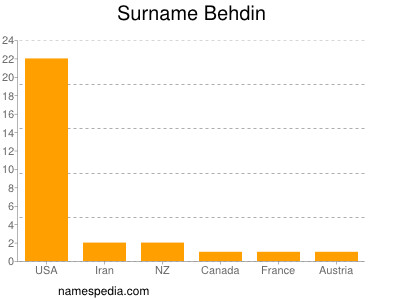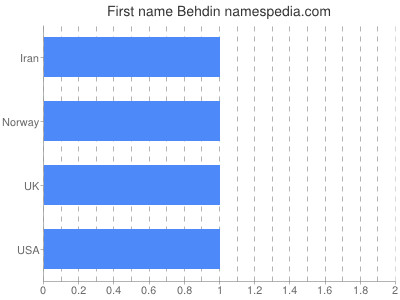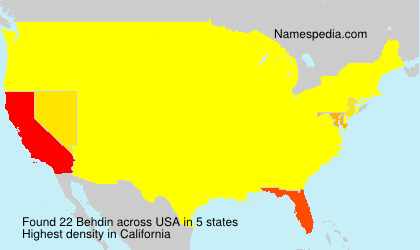Statystyki i znaczenie imienia Behdin
Użycie: 12% imię, 88% nazwisko.
Imię Behdin zostało odnalezione 4 razy w 4 różnych krajach.
Nazwisko Behdin zostało użyte co najmniej 29 razy w co najmniej 6 krajach.
 | Nadane imiona
Alireza Behdin (1) Sandrine Behdin (1) Ron Behdin (1) |
 | Nazwiska Behdin Ali (1) Behdin Mirsalehpour (1) |

Behdin pisany od tyłu to Nidheb
Imię zawiera 6 liter - 33.33% samogłosek and 66.67% spółgłosek.
Anagramy: Nedihb Hbeidn Bheind Ehbind
Rymy: Behdyn Behdjn Behden Behdina Bhedin Behdni Behidn
Rhymes: Aladdin Borodin Cardin Chernomyrdin Dunedin Hardin Odin bedding reading wedding heading shedding
Meaning of this name is unknown.
Andaz Hwaize says: BEHDĪN (Av. vaŋuhī daēnā, Pahl., weh dēn) “the Good Religion,” i.e., Zoroastrianism, or one of its adherents, in modern usage, specifically of the laity. In the Gāθās, Zaraθuštra calls his religion or vision (daēnā) good or best (Y. 44.10, 53.1, 4); it is subsequently further qualified as “Mazdā-worshipping” (e.g., Sīrōzag 1.24, daēnayǡ vaŋhuyǡ māzdayasnōiš), or as “Ahuric” (āhuirī-) and “Zoroastrian” (zaraθuštrī-); in Pahlavi, wehdēn seems to have come to denote a believer, for the religion is often called wehdēnīh, with the addition of the abstract nominal suffix (e.g., Šāyest nē šāyest 7.6, 9.4). The religion is variously called weh dēn ī pōryōtkēšān “the Good Religion of the Ancient Sages,” dēn ī rāst ī weh “the true Good Religion,” etc. The term hudēn “of Good Religion” is used as an equivalent to wehdēn. Wehān “good men” in most contexts appears to mean “Zoroastrians” (in the prayer (Čiθrəm buyāṱ it is in apposition to dahmān “believers”). In the Persian Rivayats (tr. Dhabhar, p. 439), the Good Religion, or the community of its adherents, Behdīn, is considered the equivalent of Ērān “Iranians.” In opposition to Zoroastrianism are the other faiths, which are characterized as ǰud dēn “other religion,” akdēn “evil religion” (Av. aγa daēna, of the daēva-worshippers, Vd. 18.19), or wattar dēn “worst religion”; in the Āfrīn ī Zarduxšt, the monster-tyrant Dahāg is the exemplar of the latter. According to Vīdēvdāt 4.44, all things should be shared with one who is hamō.daēna- “of the same religion,” while Dēnkard 6.55 decrees that dēn andar hamdēnān uskārišn “the Religion is to be studied among those of the same religion”; the goods and wisdom of the community are to be kept within it. According to Pursišnīhā 46 (ed. K. M. JamaspAsa and H. Humbach, Wiesbaden, 1971) “a man who is of evil religion or a non-Iranian” (mard-ē akdēn ayāb anēr) cannot be accounted righteous (ahlaw), i.e., justified, at death, however close his relations may have been with wehdēnān in life. Although the theological texts appear to erect a fence around the Good Religion, Dēnkard 3.172 also preaches propagation of the faith, for when all humans confess the Wehdēn, evil will be destroyed and hamāg xwārīh “entire felicity” will reign on earth. In present-day Parsi usage behdīn denotes a lay member of the community as opposed to the priesthood (athornān).
Ta strona została odwiedzona w następujących krajach:





Domeny Behdin.com - REGISTERED Behdin.net - FREE Behdin.co.uk - FREE Behdin.de - FREE |
Recent searches: Janir Pesavento Abeyawardene Skeffers Altan Ranghella Karacheban Haddag Chizue Kohzad
Top searches: Brian Evans Suchocki Dragos Davide Vitelaru Martin Ali Aaishah Zrubek
Random names: Latstetter Santti Jeye Landrich Jamth Cursaz Sadlos Meineche Hastedt Bobeth
lub pochodzeniu tego imienia?
Zostaw komentarz...